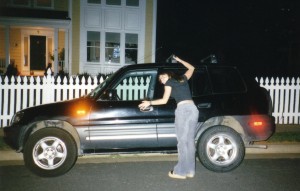
I love the freedom driving provides. As soon as I got my driver license at age 16, I was on the road a lot. Gas was cheap and it was a good way to have some alone time for thinking and it also improved my social life as I no longer had to rely on my parents to drive me places, especially once my family moved to a suburb without public transportation. Also, anecdotally, I’ve found that many women in the U.S. feel that being able to drive rather than being reliant on public transportation or walking cuts down on harassment from men in public.
So today when I read an article in the Miami Herald about how some of Saudi Arabia’s restrictive policies are slowly changing, the following part of the article touched a nerve for me, not only because it reflects an antiquated attitude that it is better to cloister women than to teach men not to harass them, but also because I feel outraged that so many women will never know the freedom and power of getting in a car and driving wherever they want, whenever they want, just because they are female.
An excerpt from the Miami Herald:
“Like many fathers with teenage daughters, the time finally came for Abdel Mohsen Gifari to have an awkward talk.
The 44-year-old researcher for Saudi Arabia’s feared religious police sat one of his girls down to discuss an uncomfortable topic: She wanted to drive.
In a country where women are barred from getting behind the wheel, his daughter’s desire is not only forbidden, it’s also a touchy subject for Gifari, who’s spent nearly half his life working for the government body charged with enforcing the law.
“‘I told her that driving is allowed in Islam,’ Gifari said in a rare interview with a Western reporter. ‘But it is more of a cultural thing. We already have a lot of problems on the road when it comes to sexual harassment, with guys flirting with girls in the car. If a woman drives, it’s only going to bring more problems.’
Change is seeping slowly into Saudi Arabia, a Persian Gulf nation of 28 million residents – half of whom are under age 25 – and nowhere is the social friction more apparent than inside the religious police force that imposes the Kingdom’s conservative interpretation of Islam…
As for his own daughter’s desire to drive a car, Gifari said, after a half-hour chat, she agreed with her dad that the timing wasn’t right.
‘Maybe in a few years traditions will change,” Gifari said. “But right now it’s only going to bring problems – and it’s not one of the government priorities.'”
I hope that one day she and other women who want to will be able to drive, and I feel humbled that it took reading her story for me to remember not to take for granted the privilege I enjoy every day of being able to drive.

Beckie Weinheimer says
I had no idea! How horrible. Thank you for sharing this article!